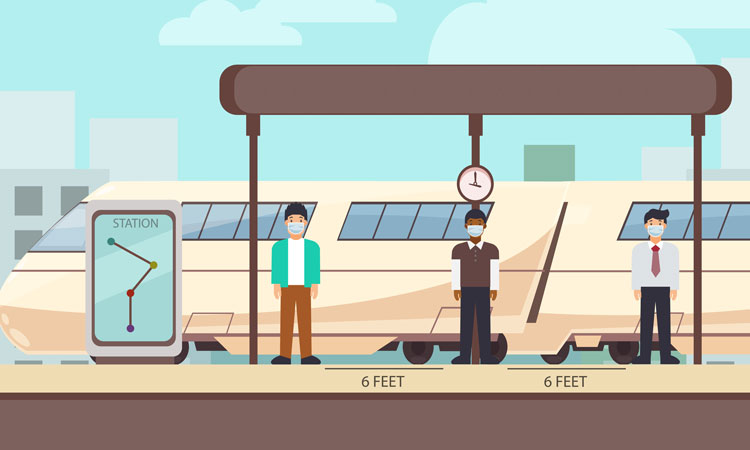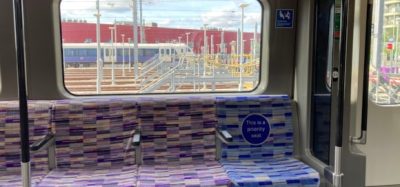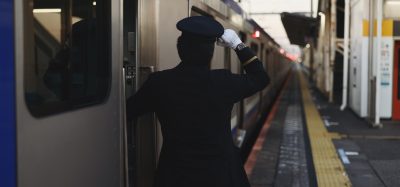Face coverings to become mandatory on public transport in England
Posted: 5 June 2020 | Global Railway Review | No comments yet
The Department for Transport (DfT) has announced that from 15 June 2020, it will be mandatory for passengers to wear face coverings when using public transport in England.


The Transport Secretary, Grant Shapps, has announced that the government will work with operators to make it mandatory for passengers to wear face coverings when using public transport in England.
Wherever possible, people should continue to avoid public transport and instead walk, cycle or drive, but for some people this may not be an option. Transport usage has been slowly increasing, including on London’s Tube network which has seen around a 20 per cent rise over the last week.
When necessary to use public transport, people may be more likely to be in enclosed spaces for longer periods of time where there is a greater risk of the spread of the virus and social distancing is likely to be difficult to follow consistently. This differs from enclosed spaces like shops, for example, where people can more easily go outside if social distancing is not possible, and where shop owners can place limits on the number of customers allowed inside at any one time.
The Scientific Advisory Group for Emergencies (SAGE) has set out that using face coverings in this setting can provide some small additional protection to fellow passengers and can help people to avoid unknowingly spreading the virus if they are suffering from coronavirus, but not showing symptoms.
Speaking at the Downing Street coronavirus briefing on 4 June 2020, Grant confirmed the government is asking operators to introduce face coverings as a requirement for travel from 15 June 2020. The government will also work closely with the transport industry to help them implement the plans.
The changes will be made under legislation such as the National Rail Conditions of Travel and Public Service Vehicle Regulations for buses. While the government expects the vast majority of people to comply with the changes, operators will be able to refuse travel or issue penalty fines for those who fail to wear a face covering, in a similar way to the rules on having a ticket for travel. The British Transport Police (BTP) will also support the implementation of these changes.
Social distancing and hand washing remain by far the most important disease prevention measures but it is also vital all passengers travelling on buses, coaches, trains, trams, ferries and aircraft should wear a face covering and the government will also work with operators to ensure staff are provided with, and wear face coverings, where appropriate for their role.
People should wash their hands or use hand sanitiser before putting their face covering on and after taking it off and it is important that people don’t touch their face covering when wearing it, where possible, to avoid hand to mask transmission of the virus.
Grant said: “People should continue to avoid public transport wherever possible. But, as restrictions are carefully eased when it is safe to do so, it’s likely that we will see more people needing to use public transport. So, while respecting social distancing and maintaining good hand hygiene remain the most important steps we can all take to stay safe, wearing a face covering can play a role in helping us to protect each other. This is about the small changes we can take to help control the virus, which is why I urge everyone using transport to wear a face covering, to help keep us all safer.”
The rail industry responds
Paul Plummer, Chief Executive of the Rail Delivery Group (RDG), said: “Wearing face coverings on trains will help to ensure that those who need to travel by rail can do so with confidence. Greater use of face coverings will boost the other measures we are putting in place to keep people safe, like more thorough cleaning, improved information on potential crowding and one-way systems at busier stations.”
Barry White, Chief Executive of Transport for the North, said: “Whilst we are working closely with the transport sector to support safe travel wherever we can, measures such as the use of face coverings, where public transport is the only option for essential travel, clearly make sense. A huge amount of work is going on across the transport sector in the North to enable effective social distancing on stations, on trains and at major interchanges. This work is being done, not only to support travellers, but those who provide the services they use.”
Anthony Smith, Chief Executive of Transport Focus, said: “People thinking of returning to public transport have told us they want face coverings to be used by all passengers. The government’s decision will provide welcome clarity and will boost pressure on others to cover up. Passengers will now need clear information on where best to find a face covering, if they will be handed out at stations and if they will be turned away if they aren’t wearing one.”
Related topics
Coronavirus/COVID-19, Passenger Experience/Satisfaction, Safety
Related organisations
British Transport Police (BTP), Department for Transport (DfT), Transport Focus, Transport for the North (TfN)








